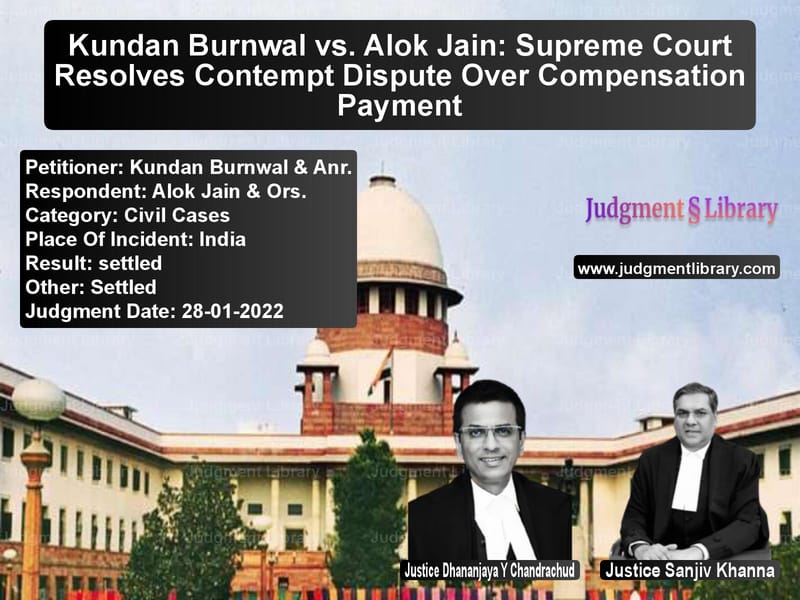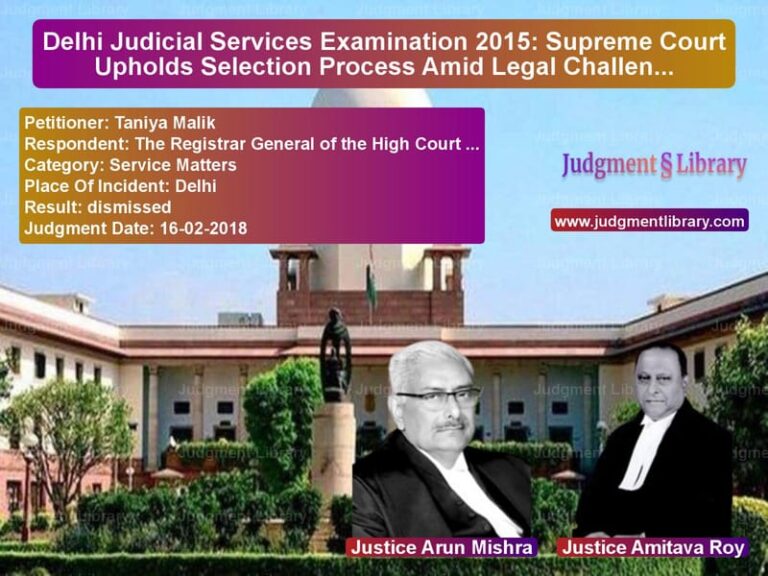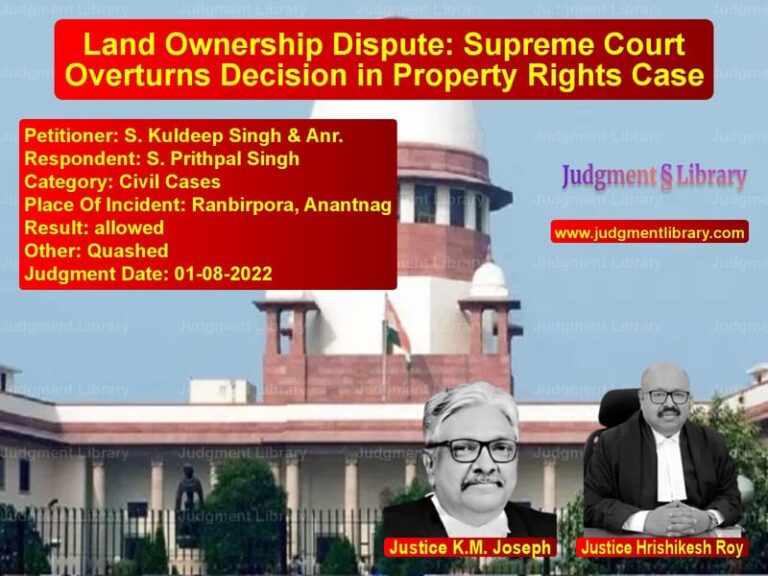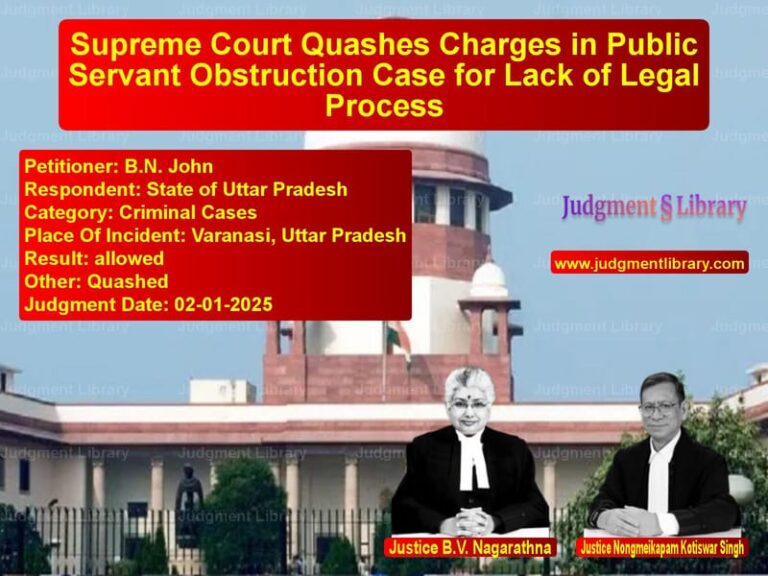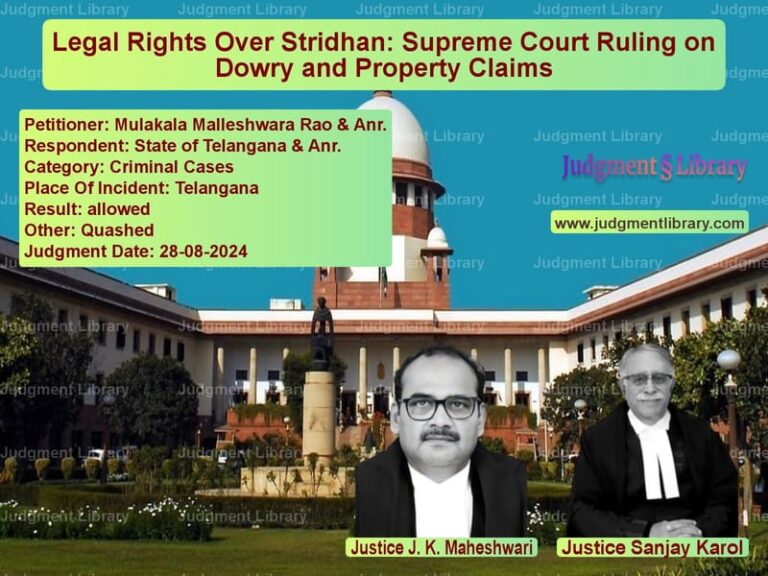Kundan Burnwal vs. Alok Jain: Supreme Court Resolves Contempt Dispute Over Compensation Payment
The case of Kundan Burnwal & Anr. vs. Alok Jain & Ors. is a significant legal matter concerning contempt proceedings related to the enforcement of a prior Supreme Court order. The dispute centered around the payment of compensation as per the court’s judgment in Civil Appeal No. 6303 of 2019. The Supreme Court had previously directed the respondents to pay the petitioners at a prescribed rate, but the petitioners alleged non-compliance, leading them to file a contempt petition.
The case highlights the importance of enforcing court directives, judicial oversight in ensuring compliance, and the role of the judiciary in preventing deliberate disobedience of legal orders. The Supreme Court ultimately disposed of the contempt petition after the respondents agreed to pay the due compensation.
Background of the Case
The dispute originated from a prior civil appeal in which the Supreme Court directed the respondents to compensate the petitioners as per a specific rate. The petitioners, Kundan Burnwal and another party, later claimed that the respondents had failed to comply with the ruling, prompting them to initiate contempt proceedings.
Read also: https://judgmentlibrary.com/supreme-court-upholds-partition-verdict-in-family-dispute-case/
Contempt of court is a serious offense, as it undermines the authority of the judiciary and prevents litigants from obtaining the relief granted to them. In this case, the petitioners sought legal enforcement of the judgment, arguing that the respondents had willfully ignored the Supreme Court’s order.
Legal Framework of Contempt Proceedings
Contempt of court is broadly classified into two categories:
- Civil Contempt: Willful disobedience of any judgment, decree, direction, or order of a court.
- Criminal Contempt: Acts that scandalize the authority of the court or obstruct justice.
In this case, the petitioners alleged civil contempt, asserting that the respondents had failed to make the required payments despite the Supreme Court’s ruling.
Petitioner’s Arguments
The petitioners, represented by Shankar Divate, made the following submissions:
- The respondents had willfully ignored the Supreme Court’s directive issued on August 24, 2020.
- Their failure to pay the compensation was a direct violation of the judgment, amounting to civil contempt.
- The delay in payments had caused significant financial hardship to the petitioners, making legal intervention necessary.
- The Supreme Court should enforce its order by holding the respondents in contempt and imposing penalties.
The petitioners sought immediate compliance with the compensation directive, along with any necessary punitive actions to deter future disobedience.
Respondent’s Arguments
The respondents, represented by Senior Advocates Kapil Sibal and Pinaki Misra, presented the following counterarguments:
- The respondents contended that they had not violated the Supreme Court’s judgment.
- They maintained that all payments made were in accordance with legal obligations and prior arrangements.
- To avoid further litigation and resolve the dispute amicably, the respondents agreed to pay compensation at the prescribed rate within two weeks.
- They clarified that any due payments, after adjusting amounts already paid, would be settled as per the court’s directive.
The respondents’ voluntary agreement to make the pending payments played a crucial role in resolving the dispute without the court needing to impose penalties.
Supreme Court’s Key Observations
A Supreme Court bench comprising Dr. Dhananjaya Y Chandrachud and Sanjiv Khanna examined the matter and made the following observations:
- The respondents’ willingness to pay the due compensation demonstrated compliance with the previous order.
- Since the respondents agreed to make the payments within two weeks, there was no further need for contempt proceedings.
- The resolution of the dispute through voluntary compliance avoided unnecessary litigation.
- The court noted that its primary concern was ensuring justice for the petitioners rather than punishing the respondents.
Final Judgment
The Supreme Court disposed of the contempt petition, issuing the following directives:
- The respondents were ordered to pay the due compensation as per the prescribed rate within two weeks.
- Adjustments for previous payments, if any, would be accounted for in the final settlement.
- Since the matter was resolved through voluntary compliance, further contempt proceedings were deemed unnecessary.
- All pending applications related to the case were disposed of.
Analysis of the Supreme Court’s Approach
The Supreme Court’s ruling reflects a balanced approach in dealing with contempt petitions. Rather than imposing penalties, the court prioritized compliance and amicable resolution. Key takeaways from the judgment include:
- Judicial Oversight: The court closely monitored compliance with its previous rulings.
- Encouraging Voluntary Compliance: By allowing the respondents to settle their dues within two weeks, the court avoided further legal complications.
- Prevention of Unnecessary Litigation: The case was resolved efficiently without escalating into prolonged contempt proceedings.
- Upholding Judicial Authority: The judgment reaffirmed that court orders must be obeyed and that non-compliance has legal consequences.
Legal Precedents and Implications
This case aligns with previous Supreme Court rulings emphasizing that contempt petitions should primarily aim at enforcing compliance rather than punishing the contemnor. Courts have consistently held that penalties for contempt should be used as a last resort.
The ruling also serves as a precedent for future cases involving non-compliance with judicial orders, reinforcing the principle that individuals and entities must adhere to legal directives to avoid contempt proceedings.
Conclusion
The case of Kundan Burnwal vs. Alok Jain underscores the importance of enforcing judicial orders and ensuring timely compliance with compensation directives. The Supreme Court’s decision to accept the respondents’ commitment to pay the due amount within two weeks reflects a pragmatic approach to resolving legal disputes.
This judgment serves as a reminder that the judiciary plays a crucial role in ensuring that its orders are implemented effectively. By facilitating an amicable resolution, the court upheld its authority while ensuring that justice was served for the petitioners.
Petitioner Name: Kundan Burnwal & Anr..Respondent Name: Alok Jain & Ors..Judgment By: Justice Dhananjaya Y Chandrachud, Justice Sanjiv Khanna.Place Of Incident: India.Judgment Date: 28-01-2022.
Don’t miss out on the full details! Download the complete judgment in PDF format below and gain valuable insights instantly!
Download Judgment: kundan-burnwal-&-anr-vs-alok-jain-&-ors.-supreme-court-of-india-judgment-dated-28-01-2022.pdf
Directly Download Judgment: Directly download this Judgment
See all petitions in Damages and Compensation
See all petitions in Contract Disputes
See all petitions in Specific Performance
See all petitions in Judgment by Dhananjaya Y Chandrachud
See all petitions in Judgment by Sanjiv Khanna
See all petitions in settled
See all petitions in settled
See all petitions in supreme court of India judgments January 2022
See all petitions in 2022 judgments
See all posts in Civil Cases Category
See all allowed petitions in Civil Cases Category
See all Dismissed petitions in Civil Cases Category
See all partially allowed petitions in Civil Cases Category

